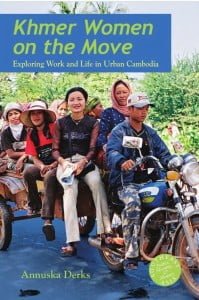Book Review of Khmer Women on the Move by Annuska Derks

By Kent Davis
Personal, engaging accounts of Cambodian women in transition Book Review of Khmer Women on the Move by Annuska Derks
Less than 1,000 years ago, the Khmer civilization raised some of the world’s most astounding temples to their Hindu gods…and as we still see today, images of ancient women dominate these temples. In A Record of Cambodia: The Land and Its People 13th century Chinese traveler Zhou Daguan confirmed that women virtually controlled Cambodian commerce.
The fact is that women have always played important roles in Southeast Asian societies, yet their roles are frequently misinterpreted or even escape the notice of historians. Annuska Derks does a fascinating job reporting on the transition of women’s roles in the complex landscape of modern Cambodia.
“Khmer Women on the Move” is quite readable. While academic books of this caliber can be obtuse, the author’s excellent scholarship doesn’t get in the way. One aspect that I found especially engaging is the way the author includes many Khmer language terms in her text — this not only adds authenticity and precision, it also gives readers an enjoyable lesson in useful Khmer vocabulary!
The author made her study quite personal by profiling a number of women, their families and the conflicts they experienced in the dichotomy of modern Cambodia. There, women face cultural crossroads that present challenging dilemmas: Rural vs. Urban; Traditional vs. Modern; Moral vs. Immoral. The author carefully, clearly examines these conflicts (and others) through the personal experiences of Khmer women who are determining their individual futures.
In reading the Acknowledgements, one discovers, perhaps not surprisingly, that the author consulted with three of the world’s foremost Cambodian scholars in preparing this work: Judy Ledgerwood At the Edge of the Forest: Essays on Cambodia, History, and Narrative in Honor of David Chandler (Studies on Southeast Asia); Penny Edwards Cambodge: The Cultivation of a Nation, 1860-1945 (Southeast Asia: Politics, Meaning, and Memory) and Trudy Jacobsen Lost Goddesses: Denial of Female Power in Cambodian History, whose works I hold in high regard and also recommend.
“Khmer Women on the Move” is a readable, interesting, personal account of Cambodian women seizing the opportunity to decide their futures, and the future of their country. But I recommend this book to a much broader group of readers. Anyone interested in learning more about the social fabric of this fascinating land will enjoy it.
